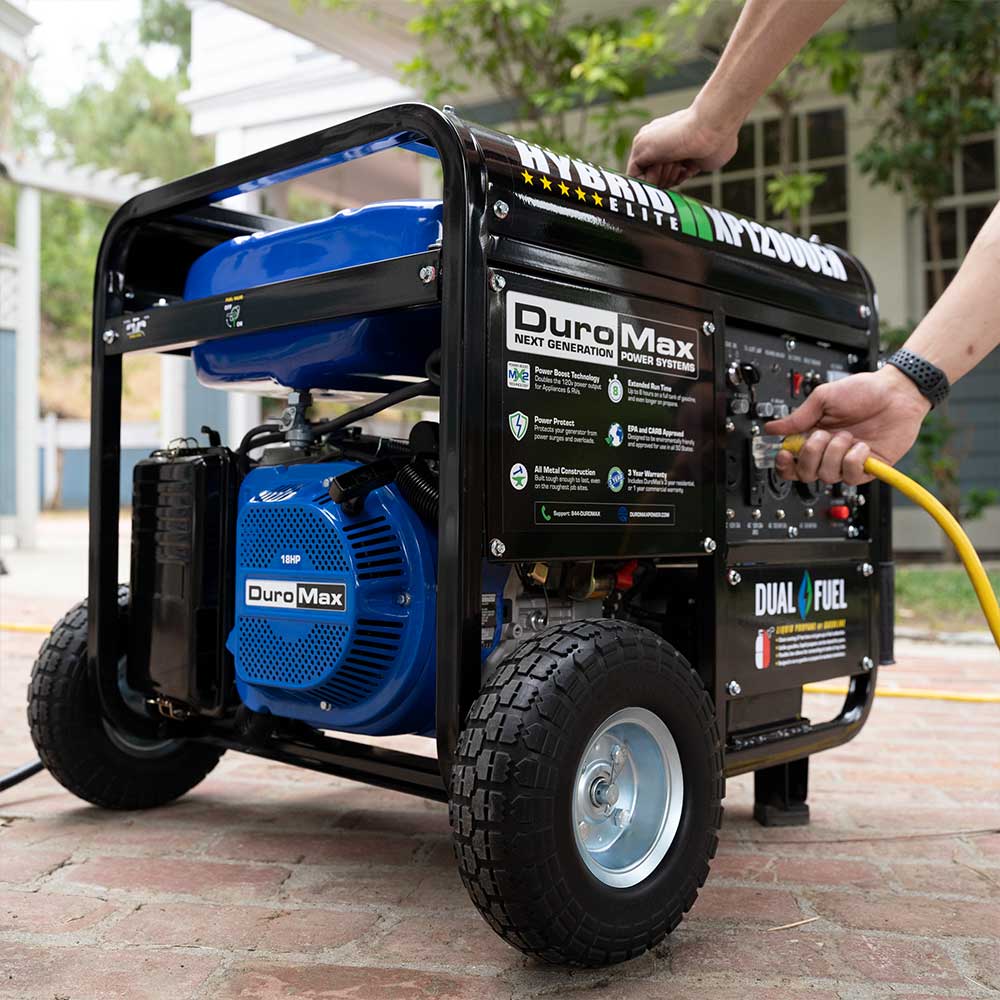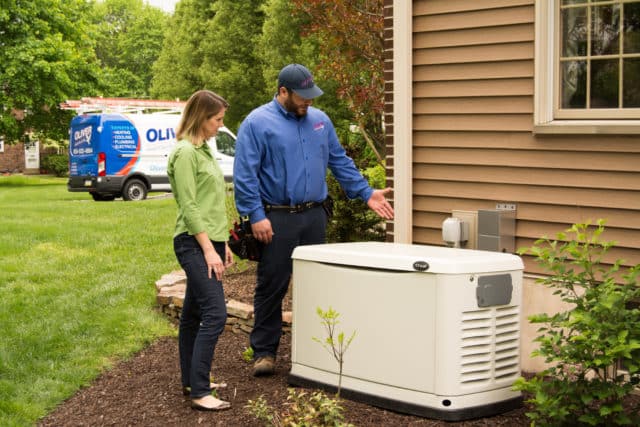Backup generators are a necessity for residential homes and commercial businesses alike. Yet, with the exception of knowing how to work them in an emergency situation, many people don’t know what they do or how to properly maintain them.
To get you up to speed on residential backup generators, we consulted with one of our experts at Generac Power Systems – residential backup generator experts – who gave us some insight into backup generator operation and how long can a generator run and how long do generators last!
How Long Do Generators Last: Inverter Generator Vs Standby Generator
A standby generator is designed to automatically provide electricity during a power outage. It is permanently installed at the home or place of business and automatically disconnects from utility feed wires, connects generator feed wires, and starts the generator engine when there’s an interruption in the power supply.
The automatic transfer switch will detect a power failure and will automatically send a signal to start the generator.
An Inverter generator is designed for temporary use and primarily provides emergency battery backup during short outages of less than three hours or in emergencies such as storms, flooding, wildfires, earthquakes, etc. Standby generators are also used when there’s an outage that lasts.
How Long Do Inverter Generators Last?

Based on this query, you can expect the typical portable camping generators to last 1,000–2,000 hours. Manufacturers of portable inverter generators, like Gentrax, also offer full support or a warranty for units with up to 1,000 hours of operating time.
Typically, Inverter generators have a lifespan of 20 to 30 years, depending on how often they run and how well they are maintained. A 30-year lifespan is possible if the generator runs only for short periods of time and it’s well-maintained. (source)
The 30-year period assumes about 30 hours per month, or one hour every other day on average. It also assumes an annual maintenance visit to check belts, filters, and fluid levels and most importantly replace any worn-out parts before they get permanent damage.
Also, in 30 years, generators should have a reconditioning process performed every five years to clean the inside of the generator and replace any aging parts.
How Long Will a Standby Generator Last in an Outage?

When you take care of a Standby Generator, it can last for 5000 hours. The life span of the average generator set is 3000 hours or 8 hours per day on an ongoing basis.
To estimate how long the generator will last, take into account how many hours you would like to run it per year.
For example, a generator with a run time of 20 hours at a time will last roughly 60 hours in a year. Standby generators typically last for 3 hours on a full tank of gas.
The average lifespan for most standby generators is about 3000 hours, which equates to running eight hours per day on an ongoing basis without maintenance visits or other breaks.
Buying a Generator That Will Last Long
Generator lifespan varies from brand to brand and is also dependent on the frequency of use. We will happily help you select a long-lasting generator that provides backup power for your home or business. You can read our full reviews of different brands of generators.
Look for the brand that best suits your needs and budget.
Experts say to keep in mind the size of the generator you need, pressurized lubrication, and other factors that will make it last for years to come.
You can use our Generator Sizing Calculator to find out what type of generator you need.
Generator Maintenance and Repair
At a minimum, a generator should be serviced by a certified technician at least once a year and the oil & filters changed during that time.
Standby generators are typically used for backup power in case of an outage or emergency. It is important to keep them running as often as possible because they have engine coolant lubricating oil that needs changing every 100 hours of use.
A professional technician will check the oil, spark plugs, batteries, and belt drives.
It is also important to clean your generator by yourself every month and check for loose wires. The cleaner you keep the machine, the better it will work when needed!
Just follow these easy steps:
- Make sure the engine has cooled down before doing an oil change.
- Check engine oil level monthly with a dipstick.
When to Replace Your Portable Generator
You will notice some signs that your home generator may be in need of replacement.
One sign is if the light flickers or cuts out when it shouldn’t and the other is that the engine takes a long time to start up.
The maintenance schedule for generator maintenance varies depending on how often you use it, but most portable generators can run 100 hours per year which is about every 20 to 40 years.
One common sign of a worn-down generator is high fuel costs. Fuel shouldn’t be an issue if you have a natural gas generator because it will be connected to your home’s gas line and it can run continuously.
Fuel, however, needs to be your main priority if you have a diesel generator or propane generator. The majority of generators come with a 24-hour fuel tank, although larger tanks can be bought if you need more space.
As mechanical parts become less efficient over time, the engine must consume more fuel to produce the same amount of power. You may reach a point where you decide it’s worth buying a new generator to reduce the amount you are spending on fuel. Old generators also tend to require more maintenance.
Regulations governing air quality are always evolving and tend to get stricter. Our government has tightened the regulations governing diesel and natural gas generators because climate change is occurring at an ever-increasing rate.
Age-related fuel consumption and high carbon monoxide emissions from generators are harmful to the environment, according to scientific studies.
The likelihood is that your generator does not comply with the most recent environmental regulations for power generation equipment if you start to see either of these symptoms develop.
How to Extend the Life of Your Generator
Generators can last a long time with proper maintenance. Be sure that the oil is at the right level and also be sure to keep it out of bad weather.
You might need to shut the generator down every now and then. This way, the engine will cool down and it can run better.
Take a look at these five tips to increase the lifespan of your generators:
Regular Maintenance – Generators require routine maintenance, like engine cooling and checking the oil levels. Different parts of generators need their own type of care, so be sure to read your instruction manual for more information about how exactly you should maintain it. Doing this will ensure that your generator is running at maximum efficiency.
Check Your Oil Levels – Always check your backup generator oil levels to make sure they are not too low. If the level is below “ADD” on the engine oil dipstick, then add engine oil until it reaches that point.
Regular Cleaning – Regularly clean your generator by taking off any debris and making sure all parts of your generator are free from corrosion or dust build-up.
Battery Inspection – Check the battery if there is any leak, corrosion, or bulging. If any of these apply, replace the battery with a new one and wipe down all metal surfaces to remove acid deposits.
Cover Your Generator – Always cover your generator when it is not in use, whether that be during an outage or inclement weather conditions such as rainstorms or winter snowstorms. This will help protect the generator for lasting long.
